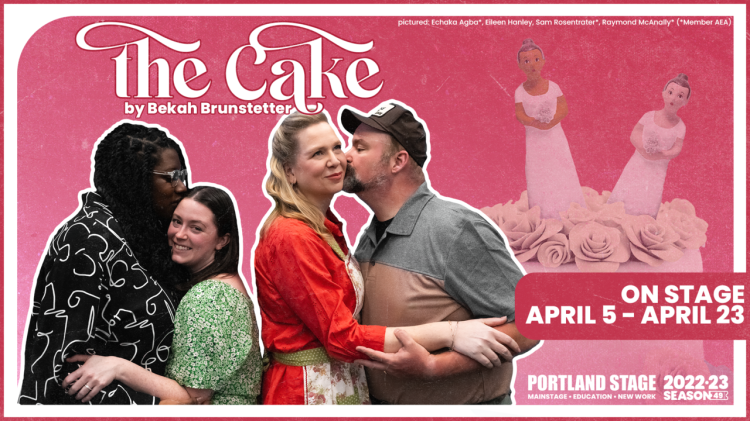Della has planned to bake Jen’s wedding cake since she was a little girl. Jen is her best friend’s daughter after all. But when Jen comes home to North Carolina from New York City, freshly engaged and freshly gay, Della doesn’t know what to do.
Inspired by a 2018 Supreme Court case, The Cake is Portland Stage’s season closer, an exploration of how legal precedents play out in our real lives. Director Todd Brian Backus and actor Eileen Hanley, who makes her Portland Stage debut as Jen, joined a conversation a week before opening.
Right now, with the erosion of LGBT rights across our country, I am struggling with compassion for people like Della who might not extend the courtesy to my loved ones. Why should I care about this character?
BACKUS: Well, that’s what drew me to this play. We see a lot from Della’s point of view. We see a person struggling to understand how a concept that she has believed her whole life conflicts with a person that she knows and loves. And it is hard for her! Most humans are a bunch of complicated ideas and feelings, and we can’t see people as pure or disposable. So, the play offers compassion, but it doesn’t let her off the hook.
HANLEY: You genuinely like all the characters, and you also dislike them all. They all have moments where you’re like, “I can’t stand you,” and then moments where you’re thinking, “oh, you’re kind of cool and funny and I understand where you’re coming from.” That’s what I hope will make the play ring true for as many people as possible.
Now Jen is engaged to Macy, who is from New York and Black. That’s a lot of cultural difference to reconcile, on top of these character’s personalities.
HANLEY: I think what helped is that early on we as a cast had some heavy discussions about the power dynamic. My co-star, Echaka Agba [member of Actor’s Equity Association], we just met doing this show and she’s great. Her character is the assertive one, but we are in Jen’s territory and it’s easy to revert to that childhood self. I have a lot in common with Jen. I think it’s easy for straight people to not see discrimination as an everyday problem for gay people everywhere. I have an immense amount of privilege, and I still feel discrimination. It is not something we get to opt out of.
What is your favorite scene to perform?
HANLEY: I love performing the last scene because I am also very different from Jen. One way is that I’m very assertive. That has been difficult for me to reconcile as an actor, to not judge her. But she does finally defend herself and her fiancée, Macy. I love that she finds the courage to be who she is and stand up for the people she loves. That is very cathartic for me as an actor.
And Todd, what moment stands out for you?
BACKUS: There’s a part in scene one, where Jen is stumbling coming out to Della. There’s this brief window where she thinks that everything’s all right. She and Macy get to be comfortable in this space and we see how much they care about each other, how truly devoted they are to one another. How do we make moments like that shine so bright that they make Della question all her beliefs?
Is there something going on behind the scenes that would add to how we understand this story?
BACKUS: When we decided to produce this show, I thought, is this still topical? The case is decided. But we’re getting another Supreme Court decision in June, again about equal accommodation, this time for making websites. This is still very much happening. So how do we all talk about these ideas? I really love this play. It’s smart, funny, and sad. I’m excited that we get to do it.

Comments are not available on this story.
Send questions/comments to the editors.


